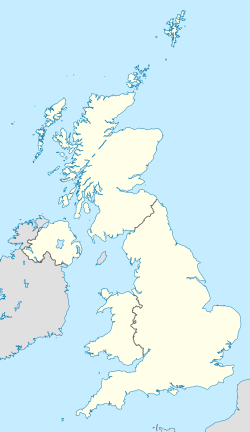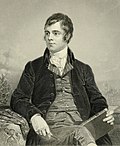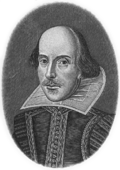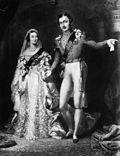Portal:United Kingdom
The United Kingdom Portal
 |
 |

| |
The United Kingdom of Great Britain and Northern Ireland, commonly known as the United Kingdom (UK) or Britain, is a country in Northwestern Europe, off the coast of the continental mainland. It comprises England, Scotland, Wales, and Northern Ireland. The UK includes the island of Great Britain, the north-eastern part of the island of Ireland, and most of the smaller islands within the British Isles, covering 94,354 square miles (244,376 km2). Northern Ireland shares a land border with the Republic of Ireland; otherwise, the United Kingdom is surrounded by the Atlantic Ocean, the North Sea, the English Channel, the Celtic Sea, and the Irish Sea. The UK maintains sovereignty over the British Overseas Territories, which are located across various oceans and seas globally. The United Kingdom had an estimated population of over 68.2 million people in 2023. The capital and largest city of both England and the United Kingdom is London. The cities of Edinburgh, Cardiff, and Belfast are the national capitals of Scotland, Wales, and Northern Ireland, respectively.
The UK has been inhabited continuously since the Neolithic. In AD 43, the Roman conquest of Britain began; the Roman departure was followed by Anglo-Saxon settlement. In 1066, the Normans conquered England. With the end of the Wars of the Roses, the English state stabilised and began to grow in power, resulting by the 16th century in the annexation of Wales, and the establishment of the British Empire. Over the course of the 17th century, the role of the British monarchy was reduced, particularly as a result of the English Civil War. In 1707, the Kingdom of England and the Kingdom of Scotland united under the Treaty of Union to create the Kingdom of Great Britain. In the Georgian era, the office of prime minister became established. The Acts of Union 1800 incorporated the Kingdom of Ireland to create the United Kingdom of Great Britain and Ireland in 1801. Most of Ireland seceded from the UK in 1922 as the Irish Free State, and the Royal and Parliamentary Titles Act 1927 created the present United Kingdom.
The UK became the first industrialised country and was the world's foremost power for the majority of the 19th and early 20th centuries, particularly during the Pax Britannica between 1815 and 1914. The British Empire was the leading economic power for most of the 19th century, a position supported by its agricultural prosperity, its role as a dominant trading nation, a massive industrial capacity, significant technological achievements, and the rise of 19th-century London as the world's principal financial centre. At its height in the 1920s, the British Empire encompassed almost a quarter of the world's landmass and population, and was the largest empire in history. However, its involvement in the First World War and the Second World War damaged Britain's economic power and a global wave of decolonisation led to the independence of most British colonies. (Full article...)
Featured article
Navenby is a village and civil parish in Lincolnshire, England. Lying 8.7 miles (14 km) south of Lincoln and 8.9 miles (14 km) north-northwest of Sleaford, Navenby has a population of 1,666 and is a dormitory village for Lincoln. It forms part of the North Kesteven local government district. A Bronze Age cemetery has been discovered in the village, as well as the remains of an Iron Age settlement. Historians also believe Navenby was a significant staging point on the Roman Ermine Street, as the Romans are reported to have maintained a small base or garrison in the village. Navenby became a market town after receiving a charter from Edward the Confessor in the 11th century. The charter was later renewed by William Rufus, Edward III and Richard II. When the market fell into disuse in the early 19th century, Navenby returned to being a village. The civil parish of Navenby is rural, covering more than 2,100 acres (8.5 km2). It straddles Ermine Street, a Roman road built between 45 and 75 AD, which runs between London and York. The Viking Way, a 147-mile (237 km) footpath between the Humber Bridge in North Lincolnshire and Oakham in Rutland, also cuts through the village. Among the buildings of note in Navenby is Mrs Smith's Cottage, a mid-19th century Grade II listed building made from early Victorian red bricks which is now run as a museum. (Full article...)
Featured biography
J. R. R. Tolkien was a British writer and university professor and is best known as the author of The Hobbit and The Lord of the Rings. He was a professor of Anglo-Saxon language at Oxford University from 1925 to 1945, and of English language and literature, also at Oxford, from 1945 to 1959. He was a strongly committed Roman Catholic. Tolkien was a close friend of C. S. Lewis, with whom he shared membership in the literary discussion group the Inklings. In addition to The Hobbit and The Lord of the Rings, Tolkien's published fiction includes The Silmarillion and other posthumously published books about what he called a legendarium, a connected body of tales, fictional histories, invented languages, and other literary essays about an imagined world called Arda (Middle-earth), and Middle-earth. Most of these works were compiled from Tolkien's notes by his son Christopher Tolkien. The enduring popularity and influence of Tolkien's works have established him as the "father of modern fantasy literature". Tolkien's other published fiction includes stories not directly related to the legendarium, some of them originally told to his children. (Full article...)
General images -
Subportals
WikiProjects
Things you can do
- Visit the British Wikipedians' notice board.
- The noticeboard is the central forum for information and discussion on editing related to the United Kingdom.
- Comment at the British deletion sorting page.
- This page lists deletion discussions on topics relating to the United Kingdom.
Featured pictures
Did you know -

- ... that a Space Forge satellite is scheduled to fly on the first-ever satellite launch from the United Kingdom?
- ... that neighboring British Sierra Leone and Liberia disputed their border, and the British Empire seized the disputed territory in 1885?
- ... that Youlgreave in Derbyshire is one of only a few villages in the United Kingdom to be supplied by its own private waterworks?
- ... that, before same-sex unions were legally recognised in the UK, the London Partnership Register allowed nearly 1,000 couples to celebrate their relationships?
- ... that in Crippled, author Frances Ryan describes a disabled British woman who was unable to afford heating or her specialist meals due to an austerity programme that began in 2010?
- ... that Dublin property developer Harry Crosbie received an OBE from the British ambassador to Ireland, partly for entertaining Elizabeth II with his showbiz contacts?
In the news
- 12 April 2025 – Steel Industry Act 2025
- The British government passes emergency legislation to control some management decisions at British Steel in order to prevent the closure of the Jingye Group-owned Scunthorpe Steelworks. (BBC News)
- 10 April 2025 –
- The United Kingdom's Cabinet Office announces it will cut around 2,100 jobs from its department, about a third of its total workforce, as part of wider government spending cuts. (BBC News)
- 9 April 2025 –
- Universal Destinations & Experiences formally announces that they have chosen a site near Kempston Hardwick in Bedfordshire, England, as the location for their Universal Studios United Kingdom resort. The theme park will officially open in 2031 and will be the largest theme park in the UK upon completion. (AP)
- 7 April 2025 –
- The first birth of a baby in the United Kingdom to a woman with a transplanted womb is announced. The baby girl, delivered at Queen Charlotte's and Chelsea Hospital in London to a 36-year-old woman, is reported to be healthy. (BBC News)
- 5 April 2025 – Tariffs in the second Trump administration, Executive orders in the second presidency of Donald Trump
- UK-based multinational car manufacturer Jaguar Land Rover suspends vehicle exports to the United States for a month to evaluate the impact of Trump's tariffs on the automotive industry. (Fox Business)
- 5 April 2025 – Israel–United Kingdom relations
- Israel blocks two British Labour Party MPs from entering the country. (Reuters)
Categories
Other UK-connected Wikipedias
Wikimedia
The following Wikimedia Foundation sister projects provide more on this subject:
-
Commons
Free media repository -
Wikibooks
Free textbooks and manuals -
Wikidata
Free knowledge base -
Wikinews
Free-content news -
Wikiquote
Collection of quotations -
Wikisource
Free-content library -
Wikiversity
Free learning tools -
Wikivoyage
Free travel guide -
Wiktionary
Dictionary and thesaurus






















































































































